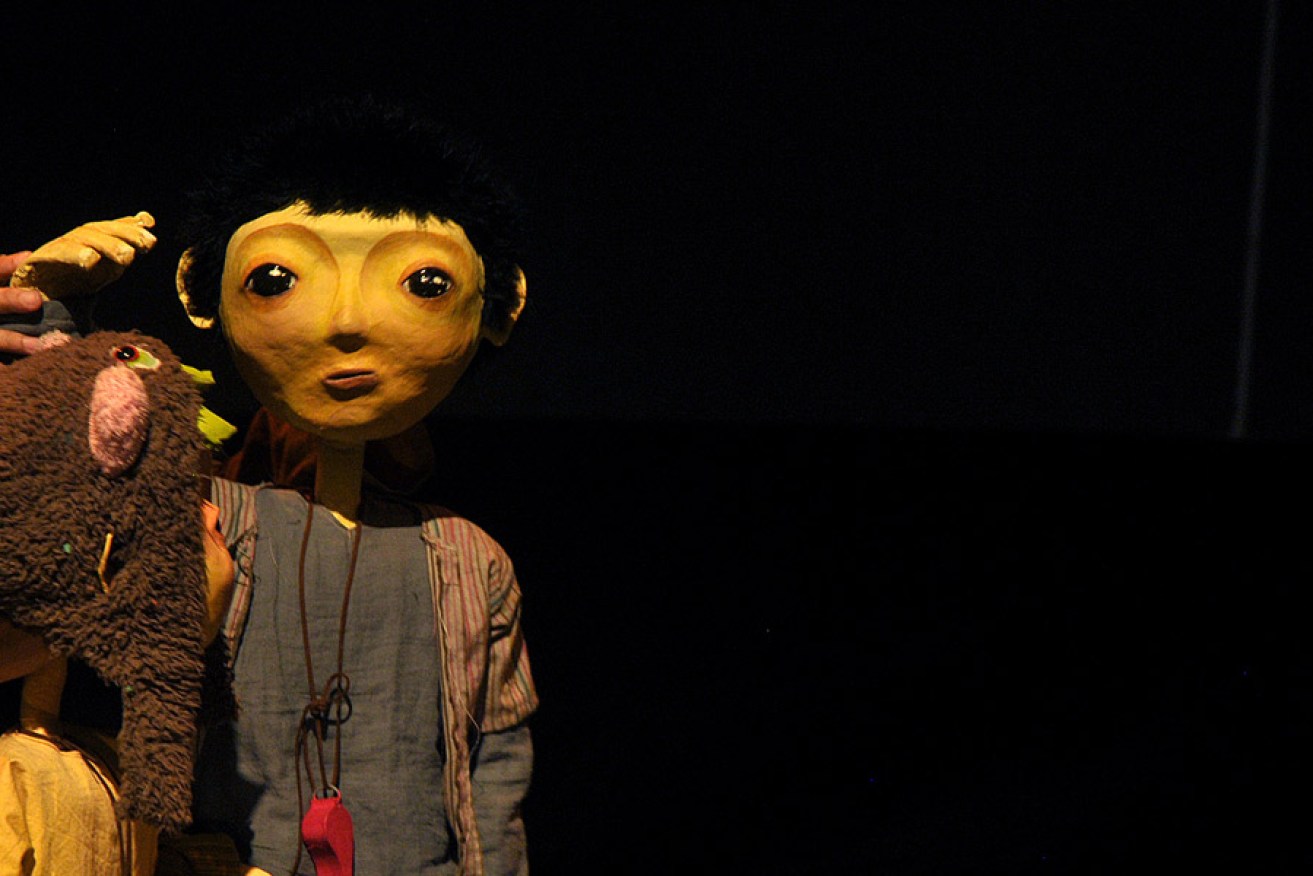What if your world was turned upside down?
The year is 1965. It’s a time when houses have eyes: a time of change, when political upheaval after a failed coup in Indonesia is upending lives, bringing conflict and suspicion to previously harmonious communities.
Moyo, who lives with his little brother Tupu and their father Baba in the Indonesian jungle, is a happy, helpful child. He’s Tupu’s protector – always nearby to fix a broken toy or ward off snarling dogs.
Small, human moments of joy and tenderness remind us that children’s lives across the globe share many similarities. A singe red balloon, a gift from Baba, soothes cranky Tupu. A hobby horse and a slingshot are much-loved playthings. One red whistle – on a string around Tupu’s neck – is a most important possession. It’s for summoning help.
The simple set of Indonesian company Papermoon Puppet Theatre’s Mwathirika lets the puppets tell the story. Two huts sit side by side, covered with patchwork strips of fabric suggesting camouflage. Projections and shadows play on a central scrim, adding story elements to the action occurring on stage.
Five large papier mache puppets are used to portray the main characters of the children, their father and two neighbours. A set of tiny, white, hand-held dolls are manipulated, very simply and effectively, to show the more shocking elements of the story. Performers in masks add a third dimension to the action.
One day a soldier appears in the village, then another. Their numbers multiply as they hunt for their targets, and vigilance and suspicion begin to seep into daily life. A neighbour sweeps but also watches. There are accusing gazes. A nod gives away much when a freshly painted red triangle appears on the window of a former friend.
Young Tupu is oblivious to the danger but Moyo spots the enemy. Baba is taken away, and in the days and months that follow the children must fend for themselves. Help no longer comes when the red whistle blows.
This performance is nuanced and engaging, with subtle gestures mimicking real life and building our connection with the individual characters. A team of incredibly skilful puppeteers continually assemble and dismantle walkways and scenes while bringing their small people to life. In the background, an electronic soundtrack stitches together the sounds of barking dogs, croaking frogs and loud, pulsating beats to evoke the hum of daily living and the horror that follows.
Papermoon Puppet Theatre was formed in 2006 by illustrator, writer and theatre performer Maria Tri Sulistyani and visual artist Iwan Effendi. Their aim was to create works that “imaginatively explore identity and society”.
Delicate and moving, Mwathirika opens our hearts as well as our minds to the pain of war. Although the setting of this particular story is the anti-communist purge which occurred in Indonesia in 1965-66, Papermoon’s focus on family and love, and its reminder that “tragedy happens everywhere”, is universal.
This captivating work offers us an invitation, warmly and genuinely extended, to move beyond our audience seats and connect with the stories via these beautifully expressive puppets. Its sophistication lies in telling a tale of violence, persecution and mass murder in a way that draws us in rather than repels.
Now, given the growing movement of refugees fleeing conflict across the world, the message of Mwathirika is more relevant than ever.
The final performance of Mwathirika is tonight, September 26, in the Rehearsal Room, Adelaide Festival Centre. The show is part of the OzAsia Festival, which continues until October 4.
Visit InDaily’s OzAsia Festival hub for more reviews and stories






